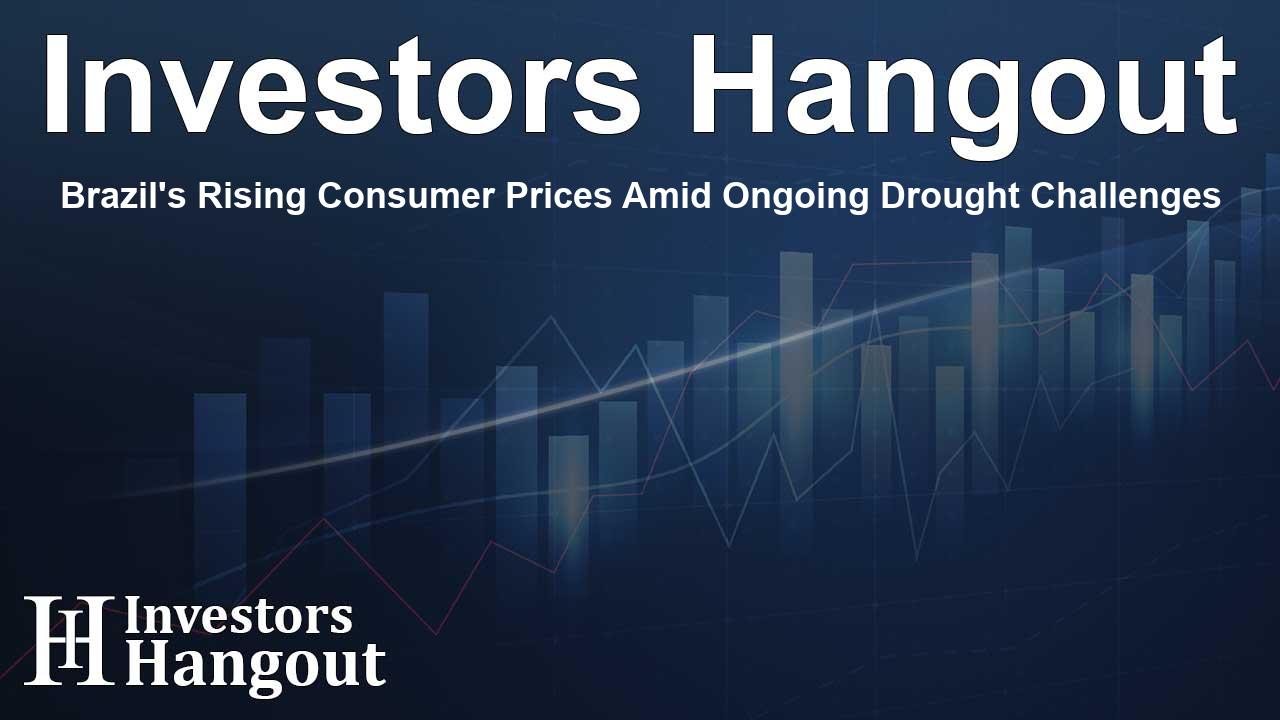Brazil's Rising Consumer Prices Amid Ongoing Drought Challenges

Brazil's Inflationary Landscape: An Overview
In recent months, Brazil has experienced a shift in its economic dynamics as consumer prices are projected to rise significantly. Forecasts indicate an increase in consumer prices for September, driven largely by the detrimental impact of a severe drought that has severely affected agricultural output.
Impact of Drought on Agricultural Output
Recent assessments show that the drought has not only influenced agricultural production but has also resulted in a marked rise in food prices. According to economists surveyed, consumer price index (IPCA) is expected to climb 0.46% from August, reflecting a 4.43% increase year-on-year. The drought has especially affected staple crops such as coffee, leading to production levels that fall short of initial forecasts.
Key Drivers of Inflation
This inflationary pressure can be attributed to multiple factors. The escalating energy tariffs, resulting from low water levels in hydroelectric reservoirs, compounded by increased cigarette prices, were pivotal in translating cost pressures onto consumers. Various food and beverage prices, including meat, dairy, and baked goods, are also feeling pressure as the drought's effects start to materialize.
Central Bank Policies Amid Inflation Concerns
Brazil's Central Bank has responded to these inflationary trends with adjustments to interest rates. Earlier this year, the central bank halted its easing cycle amid concerns over rising inflation rates, which have consistently surpassed the target of 3%. Last month, an increase in rates was implemented in hopes of curbing inflationary expectations, particularly as the country braces for a near 4% inflation rate next year.
The Economic Stimulus Debate
The strategies set forth by President Luiz Inácio Lula da Silva's administration have sparked conversations regarding fiscal responsibility. With public spending on the rise, questions loom about the long-term effectiveness of monetary policies in managing inflation. The Banco Central do Brasil's chief, Roberto Campos Neto, has expressed the challenges posed by a combination of tight interest rates and loose fiscal policy, highlighting the necessity for better coordination between monetary and economic strategies.
Economic Growth Amidst Inflationary Pressures
Despite the challenges posed by the drought and inflation, Brazil's economy shows signs of vitality. The Finance Ministry recently adjusted its economic growth forecast upward to 3.2% for the coming year, an increase from the previous estimate of 2.5%. This optimism is rooted in burgeoning economic activity, improvements in job markets, and rising real wages.
The Outlook: Balancing Growth and Inflation
As consumer prices continue to soar, economic analysts emphasize that the service sector is likely to remain resilient, with prices stabilizing above 3.0%. This complex interplay between rising prices and government stimulus illustrates the balancing act that Brazil must perform in stabilizing its economy while managing inflationary expectations effectively.
Frequently Asked Questions
What is driving the rise in consumer prices in Brazil?
The rise in consumer prices in Brazil is primarily driven by the ongoing drought impacting agricultural output, leading to higher food prices, alongside increased energy tariffs.
How has the Brazilian Central Bank responded to inflation?
In response to rising inflation, the Brazilian Central Bank halted its interest rate easing cycle earlier this year and raised rates to curb inflationary pressures.
What are the forecasts for Brazil's inflation and economic growth?
Inflation is expected to be close to 4% in upcoming forecasts, while economic growth is predicted to reach 3.2% for the next year, up from prior projections.
How is the drought affecting food prices in Brazil?
The drought has started to push food prices higher, specifically affecting commodities like fruit, meat, and dairy, due to lower agricultural yields.
What challenges does the government face amidst rising inflation?
The government faces challenges in balancing fiscal policies with effective monetary controls to manage inflation and ensure continued economic growth.
About Investors Hangout
Investors Hangout is a leading online stock forum for financial discussion and learning, offering a wide range of free tools and resources. It draws in traders of all levels, who exchange market knowledge, investigate trading tactics, and keep an eye on industry developments in real time. Featuring financial articles, stock message boards, quotes, charts, company profiles, and live news updates. Through cooperative learning and a wealth of informational resources, it helps users from novices creating their first portfolios to experts honing their techniques. Join Investors Hangout today: https://investorshangout.com/
Disclaimer: The content of this article is solely for general informational purposes only; it does not represent legal, financial, or investment advice. Investors Hangout does not offer financial advice; the author is not a licensed financial advisor. Consult a qualified advisor before making any financial or investment decisions based on this article. The author's interpretation of publicly available data shapes the opinions presented here; as a result, they should not be taken as advice to purchase, sell, or hold any securities mentioned or any other investments. The author does not guarantee the accuracy, completeness, or timeliness of any material, providing it "as is." Information and market conditions may change; past performance is not indicative of future outcomes. If any of the material offered here is inaccurate, please contact us for corrections.